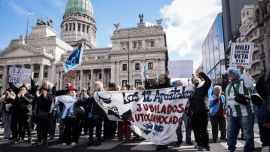Thousands of people flooded downtown Buenos Aires Wednesday in the first protest against President Javier Milei’s government and the first test of the new administration’s anti-picket protocol.
There was a substantial security presence in the capital for the rally, which came hours before the new libertarian leader announced a sweeping economic reform package designed to right Argentina’s struggling economy.
Demonstrators of leftist movement Polo Obrero and the Movimiento Socialista de los Trabajadores (Socialist Workers Movement) marched several blocks to a plaza in front of the Casa Rosada, waving banners and chanting.
Their route through the city centre was lined by military police and other security officials, including police in full riot gear, in a large show of force that protest organisers criticised as an attempt at provocation.
Members of the Federal Police, Buenos Aires City Police and Gendarmerie (Border Guard) were tasked with containing the protest, which passed off without major incident.
"This reminds me of the dictatorship" of 1976 to 1983, said Polo Obrero leader Eduardo Belliboni, who said he had cancelled plans to rally outside the National Congress building and sent marchers direct to the presidential palace.
"The aim was to ensure both the holding of the event in Plaza de Mayo and to avoid the provocations mounted by the national government and its minister Patricia Bullrich," said the veteran picket leader.
The social organisations marched without blocking Avenida 9 de Julio. For the most part, public transport ran as usual, with Metrobus and Subte train lines functioning as normal.
Left-wings leaders including former presidential candidate Myriam Bregman, former City mayoral candidate Vanina Biasi and lawmakers Gabriel Solano and Néstor Pitrola were among those in attendance.
The security operation was supervised from police headquarters by the right-wing Security Minister Patricia Bullrich, televised images showed. President Milei also visited to oversee operations.
"I've come here to defend democratic freedoms, the freedom to demonstrate," Ezequiel Pretti, a 34-year-old worker, told AFP. "There is a brutal adjustment and we have to organise and go out to resist."
Last week the government devalued Argentina's currency by more than 50 percent as part of a series of "shock" measures aimed at reviving a crumbling economy.
Milei expected additional measures Wednesday night, including a deregulation of the labour market, the repealing of at least seven laws and the initial steps needed to privatise state companies.
Argentina has one of the world's highest inflation rates, at 161 percent year-on-year, and 40 percent of citizens are in poverty.
In addition to opposing Milei's austerity measures, the demonstrators commemorated the anniversary of the protests of December 19 and 20, 2001, which left 39 people dead amid the worst socio-economic and political crisis in the country's recent history.
The groups who demonstrated on Wednesday said they were marching in defence of “genuine work, wages, pensions, health and education, of all our rights, against repression and the attack on social plans.”
Presidential Spokesperson Manuel Adorni, speaking on Thursday, revealed that the national government would send a bill for the security operation to picketeters' organisations that mobilised.
"Operation had an important cost" and when they are totalled, they will “be billed to each of the organisations,” said Adorni.
– TIMES/AFP


























Comments